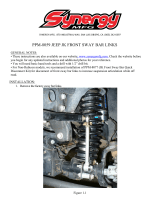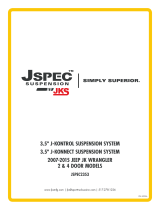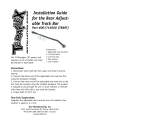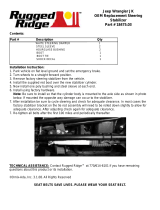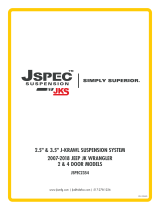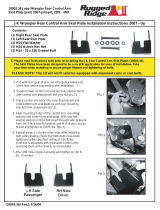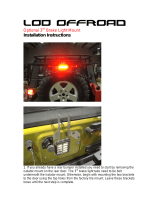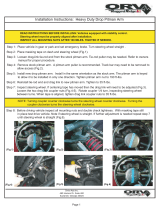Page is loading ...

INSTALLATION GUIDE
jk wrangler
3.5”–4.5” dualsport sc
suspension
AEV30213AG
Last Updated: 03/14/17

ii
PLEASE READ BEFORE YOU START
TO GUARANTEE A QUALITY INSTALLATION, WE RECOMMEND READING THESE INSTRUCTIONS
THOROUGHLY BEFORE BEGINNING ANY WORK. THESE INSTRUCTIONS ASSUME A CERTAIN
AMOUNT OF MECHANICAL ABILITY AND ARE NOT WRITTEN NOR INTENDED FOR SOMEONE NOT
FAMILIAR WITH AUTO REPAIR.
INCLUDED PARTS QTY REQUIRED TOOLS
Springs 4Basic Standard and Metric hand tools
Shocks 43/8-in Drill Bit
Bump Stop Spacer Kit 15/8-in Drill Bit
Rear Track Bar (LHD system only) 1
Rear Track Bar Tower 1
Brake Line Drop Bracket Set 1
Rear Sway Bar End Links 2
High Steer Kit 1
Drop Bracket Kit 1
Vehicle Applications 2007–Current Jeep JK Wrangler and Unlimited
Assumptions
Equipment that must
already be present on
your Wrangler
Stock JK frame and axles with all stock brackets intact.
2007–2011: Stock Exhaust-or equivalent position for clearance both where it crosses
below the front driveshaft and over the rear tack bar.
2012+: An Exhaust modication is REQUIRED to to clear the front driveshaft.
Stock Front and Rear Driveshafts
NOTE: Aftermarket units with double-Cardan joints will require a rear axle pinion angle
adjustment that is NOT provided in these systems.
NOTE: A small-diameter front driveshaft is recommended for clearance on 3.5”/4.5”
systems and all 2007–2011 vehicles with automatic transmissions.
NOTE: 28–30 PSI is AEV’s recommended tire pressure with our Suspension Systems.
Aftermarket Wheels—These are recommended both for adequate width to mount large
tires and decreased backspacing for chassis and steering clearance.
NOTE: JK Sport factory 16-in wheels will NOT clear the new drag-link included in all
Premium Suspension Systems. Any AEV JK wheel will solve the clearance issue or a
set of 1.0-in thick wheel spacers with your stock wheels.
NOTE: Wheels with extremely negative offset may negatively affect ESP.
Install Time
(Estimated)
Home/DIY/Shop 1st Install: 10–12 man/hrs; Shop 2nd or later install: 7–8 man/hrs.
Please take the time to read these instructions—They are long because we want you to get the installation right
the rst time and enjoy the product immediately thereafter! DO NOT start or attempt this product installation if you
are unsure of your abilities or do not have the resources listed above. Be sure to check all specied torques with a
torque wrench…too tight is not just right!!

1
REAR SUSPENSION
1. Raise Jeep and support the frame using jack stands or a hoist, such that the rear axle can be low-
ered enough to remove the springs. Support the axle by placing oor jack under the center of the
axle. Remove the wheels (Fig. 1).
2. Loosen but DO NOT remove all 8 control arm bolts. Detach parking brake cables from axle (Fig. 2).
3. Remove and discard the parking brake cable bracket (Fig. 3). On 4-door models the parking brake cable
will need to be re-routed BELOW the frame cross-member. Reattach parking brake cable at axle.
4. Remove the track bar.
5. Remove Axle Vent from axle.
Figure 1
Figure 2

2
Figure 3
6. Remove the bolts that hold the brake lines to the frame (Fig. 4 A).
7. Remove the shocks (Fig. 4 B).
8. Remove the sway bar end links and save. You will reuse the hardware for the rear and the end links
will be installed on the front of the vehicle. Note the orientation of the end links, the new end links
will be installed in the same way (Fig. 4 C).
A.
B.
B.
C.
NOTE: This nut is specic
to this location, it must be
returned to this location.
Figure 4

3
9. Carefully lower the axle using the oor jack enough to remove the springs. DO NOT overextend the
wheel speed sensor or locker wiring, we recommend detaching the plastic r tree cable ties from the
axle and frame to allow sufcient movement. This pertains to wheel speed wiring and locker wiring if
equipped.
10. Remove the factory springs.
11. Install the track bar tower.
A. Position the rear track bar tower on the axle and mark
the hole as shown. (Fig. 5)
B. Remove the tower and drill the hole to 5/8”
C. Install the track bar tower with the supplied hardware
using 2 of the 1/2” washers as spacers as shown.
(Fig. 6) DO NOT TORQUE THE U-BOLTS TO MORE THAN
40 ft-lbs.
12. Install the new rear track bar hand tight as shown. This
will be tightened later at ride height. (Fig. 6). NOTE: The
trackbar bolts will be reinstalled in the opposite direc-
tion from factory (B.) Use the lower mounting hole for
3.5” suspensions (shown) and the upper for 4.5” sus-
pensions.
Figure 5
2 Washers
Figure 6

4
13. Install AEV springs making sure to properly index them on the axle spring seat (Fig. 7).
REAR OF JEEP
Figure 7
14. Install new shocks at upper mount. NOTE: If installing Remote Reservoir Shocks, refer to Figure 8
for proper orientation to prevent damage to reservoir hose. It is critical that the hose for the re-
mote reservoir shocks do not come into contact with any other parts. Remember that the shock
will move as the axle travels through its range of motion, so you must be very diligent in the rout-
ing of this hose.
REAR
REAR
Figure 8
15. Raise axle slowly and guide springs into position.
16. Install AEV sway bar end links and tighten.* Re-install lower shock nut and bolt and tighten* (refer to
Fig. 4-B.) Install brake line drop brackets as shown (Fig. 9) and tighten.*
Figure 9
*Refer to Appendix for proper torque specs

5
17. Reroute the Axle Vent as shown (Fig. 10).
Figure 10
18. For 2007–2013 JK and JKU it is necessary to trim the pinch seams (and rocker guards on Rubicon
models) if running 35” tires or larger. (Fig. 11). For mid-2013 and newer JK and JKU only the Rubi-
con rocker guard needs to be trimmed. Remove the end cap and trim 1” (from rear). Follow standard
touch-up painting procedures to prevent corrosion on all cut surfaces.
3”
1.75”
Figure 11
19. Reinstall wheels and tighten lug nuts, working in a star pattern.*
DO NOT install the rear bump stop spacers at this time. These will be installed after the control arms are
torqued at ride height.
It is time to install the front suspension, however DO NOT tighten track bar or control arms at this time.
These will be torqued AFTER the front suspension is complete.
*Refer to Appendix for proper torque specs

6
FRONT SUSPENSION
1. Raise Jeep and support the frame using jack stands or a hoist, such that the front axle can be low-
ered enough to remove the springs. Support the axle by placing oor jack under the center of the
axle. Remove the wheels (Fig. 12).
Figure 12
2. Disconnect the drive shaft at the Axle end. Make sure to mark both sides of the connection so you
can properly align it when you reconnect it (Fig. 13). Tie loose end of the drive shaft up so it will not
hang down. Failure to follow this step may result in damage to your drive shaft.
Figure 13
3. Remove the automatic transmission skid plate and set aside.
4. Loosen but DO NOT remove all 8 control arm bolts.
5. Remove the following parts:
• Steering drag link (coupler to knuckle portion only)
• Steering damper
• Tie rod

7
6. On 2007-2010 models only, loosen but DO NOT remove the frame-side track bar bolt. Remove and
save the axle-side track bar bolt and ag nut (Fig. 14).
Figure 14
NOTE: On Rubicon models, remove the “r tree” zip ties holding the speed sensor wiring to the upper
control arm. On Rubicon models, unplug the locker connectors at the axle to keep from over extending
the wires during install.
7. Move the Axle Vent down and attach as shown (Fig. 15).
Figure 15

8
8. Remove and save all sway bar links and hardware. Note orientation, new links will be installed in the
same way (Fig. 16)
Figure 16
9. Remove shocks and save all shock mounting hardware.
10. For 2010 and older models, remove the bolt holding the brake line to the frame.
11. For 2011 and newer models, remove and discard factory bracket from the brake line (Fig. 17).
Figure 17
12. Lower axle and remove springs. DO NOT remove factory isolator.
NOTE: On most late model JK and JKU, there is a cross member tube extending far enough out of the frame
to interfere with the front sway bar. We recommend trimming this just outbound of the weld (Fig. 18). Re-
member to follow proper painting procedures to prevent corrosion.
Figure 18

9
13. If you are installing Remote Reservoir Shocks install the reservoir bracket at this time (Fig. 19).
Torque to 22 ft/lbs
Figure 19
14. Install Track Bar relocation brackets.
A. Place bracket with “half moon” cutouts inside the original front track bar bracket and over the axle
tube (Fig. 20-A). Insert two of the supplied 3/8” x 1.0”L bolts and washers through the small holes
in the bracket and the corresponding holes in the stock bracket, then add nuts and hand tighten.
A. B.
3/8” x 1”
Figure 20
B. Add the supplied u-bolt and nuts (visible in Fig. 22).
C. Insert the supplied spacer tube between stock track bar bracket and new bracket (Fig. 20-B), lining
it up with the original track bar bolt hole. (This may require slight prying or tapping with a hammer.)
D. Pre-assemble the second bracket as shown (Fig. 21) with the supplied bolt, washers, and free-spin-
ning nut.

10
Figure 21
E. Install this bracket in front of the stock track bar bracket on the axle and line up the small holes
with the corresponding ones on the axle bracket. Insert the remaining two 3/8”x 1.0”L bolts and
washers from the front through the brackets, add nuts and hand tighten.
F. Insert the 1/2” x 1 1/2”L bolt through the factory stabilizer tab on the side of the axle and the cor-
responding bracket hole and add the locking nut.
G. Place 9/16” x 3 1/2”L bolt through original track bar hole, both brackets, and supplied spacer tube.
H. You may now tighten and torque all fasteners.
22 ft/lbs
40 ft/lbs
100 ft/lbs
100 ft/lbs
22 ft/lbs
Figure 22

11
15. Install driver–side Swaybar relocation bracket. Position bracket over axle tube as shown (Fig. 23) Use
the other supplied 1/2” x 1 1/2” bolt to attach bracket to axle and tighten to 100 ft-lbs.
100 ft/lbs
Figure 23
16. Reattach track bar
A. Raise the axle until the axle-end of the track bar can be lined up with the uppermost holes in the
new brackets (it may be necessary to pry the brackets apart to allow the track bar to drop in easily.
TIP: We nd that using a ratchet strap to move the axle over will help with aligning the holes.
B. Insert original track bar bolt and ag nut through passenger-side front axle brackets and track bar
but do not tighten at this time (refer to Fig. 30).
17. Install Springs
A. Drill a 3/8 inch hole in the center of the axle bump stop pad (Fig. 24-A).
B. Place bump stop spacer inside springs (Fig. 24-B).
C. Install AEV springs, keeping factory isolator in place. Make sure to properly index the springs on the
lower spring seat.
D. Install and tighten supplied bump stop spacer hardware. Torque to 22 ft-lbs.
A. B.
bump stop pad
bump stop spacer
Figure 24

12
18. Install sway bar end links
A. Use the factory REAR end links removed earlier or end links with the same overall length as factory
rear JK or JKU end links.
B. For each side attach the upper end stud to the sway bar in the same manner as the original front
links had been (nut on frame side of bar). NOTE: The upper stud has a different thread than the rest
of the M12 fasteners in the suspension—it is a “normal” pitch versus a “ne pitch.” Tighten to 40
ft-lbs. (refer to Fig. 16 for proper orientation.)
C. The lower ends of the links will attach to the inboard side of the new brackets on the axle using the
original hardware. Torque to 40 ft-lbs.
19. Install shock doubler brackets
A. Install Shock Doubler brackets on both sides as shown using supplied hardware (Fig. 25).
B. Install shocks in Shock Doubler brackets as shown using supplied hardware (Fig. 25).
C. Install shocks in the upper mount. DO NOT over compress the bushings.
D. If using remote reservoir shocks, use the supplied hose clamps to secure the reservoir portion of
the shock into the bracket. CLAMP ROTATION IS CRITICAL, pay attention to prevent contact with the
washer bottle (Fig. 26).
Torque to 22 ft/lbs
Torque to 56 ft-lbs
NOTE: Use a 3/8” drill bit or the
provided self-tapping bolt to
enlarge the factory hole.
Torque to 22 ft-lbs
Figure 25
Figure 26

13
20. Install high–steer draglink
A. Apply anti-seize compound to the threads of the new draglink and thread it into the adjuster sleeve
until the amount of thread showing is similar to the amount showing on the short side that is still
attached to the pitman arm.
B. Twist the self locking tapered sleeve into the bottom of the knuckle mounting hole (the self-locking
tapered sleeve is stored between the seal and the plastic seal shipping protective cover on the
draglink outer end).
C. Install the top mount draglink into the knuckle hole from the top side and tighten the nut until the
nylock on the nut engages.
D. Hold the hex, using a 10mm wrench, on the end of the ball stud to keep the stud from turning in the
socket while tightening the ball stud nut using a 21mm wrench. Tighten until approximately 40 ft-lbs
of torque is achieved. Once the 40 ft-lbs of torque is achieved, tighten to 125 ft-lbs using a 21mm
socket.
E. Grease draglink socket through the zerk until grease purges around the boot seal; wipe off excess
grease.
Figure 27
F. Install tie rod. Torque both sides to 65 ft-lbs.
21. Install new steering damper
A. To position the tie rod bracket properly, measure 19 1/4” from the edge of the tie rod tube to
the center of the stud as shown. (Fig. 28) Rotate the tie rod bracket until the stud is pointing just
forward of straight up. Tighten the mounting bracket at this location. After the mounting bracket is
tight, tighten the factory steering stabilizer to bracket nut, torquing to 37 ft-lbs.
B. Attach the damper to the new High Steer axle bracket orienting the hardware as shown (Fig. 29).
C. Attach the damper to the factory tie rod bracket using one of the supplied 7/16” washers. Torque to
35 ft-lbs.
Rotate the black rubber boot on the damper so that the drainage holes are on the bottom.

14
19 1/4”
Figure 28
Washer
Free Nut
Spacer
Steering Damper
Washer Lock Nut
40 ft/lbs
Figure 29
Figure 30

15
22. For 2007—2010 model year JK’s install the front brake line drop brackets tightening to 8 ft-lbs (Fig. 31).
Figure 31
23. For 2011 and newer models, use supplied zip ties to secure the brake line to the shock as shown.
For Remote Reservoir shocks, secure brake line to the spring (Fig. 32).
Figure 32
24. Install the automatic transmission skid plate.
For 2011 and newer, use the 4 supplied spacers, 2 at each side of the skid plate (Fig. 33).
INSERT SPACER
INSERT SPACER
Figure 33

16
For 2007-2010
A. Hold the skid plate in position and mark where the skid plate will need to be trimmed. Trim the skid
plate as shown and paint for corrosion protection (Fig. 34).
B. Install the skid plate using the 4 supplied spacers, 2 at each side (Fig. 34).
Figure 34
C. Reinstall wheels and tighten lug nuts, working in a “star pattern.” Place Jeep on level ground. Re-
connect the drive shaft making sure to properly align your marks.
D. Install JK Geometry Correction Front Control Arm Drop Brackets using instructions included in kit.
E. You may now tighten all fasteners to factory specications.* Too tight is NOT just right.
F. Install new Bump Stop Spacers on the rear axle as shown (Fig. 35) using the supplied hardware. DO
NOT reverse the orientation from what is shown (screws should be inboard.)
*Refer to Appendix for proper torque specs

17
Figure 35
TIP: It is good practice to mark each major bolted suspension connection such as these with a paint
pen. Draw a line that runs from bolt head or nut to the adjacent bracket material. This will allow a visual
inspection to easily catch bolts that work loose. After approximately 100 miles, you should perform a com-
plete visual inspection and re-torque any suspect bolts as well as your wheel lug nuts.
AEV recommends having a professional alignment done at this point. While your Jeep is on the alignment
rack is the correct time to use the AEV ProCal to assist with centering the steering wheel. Please follow
the instructions that come with your ProCal.
AEV recommends 28–30 PSI tire pressure with our Suspension Systems.

18
jk Factory Torque Specifications
*nominal torque shown in ft-lbs.
appendix
Front Suspension & Steering
UCA bushings M12 75
LCA bushings M14 125
Track bar bushing frame M14 125
Track bar bushing axle M14 125
Stabilizer end link top M12 65
Stabilizer end link bottom M12 75
Shock Absorber upper M12 bayonet 20
lower M12 56
Steering gear 87
P/S pump to engine 21
High pressure hose pump 22
Hoses to steering gear 21
Intermediate shaft, all points M10 42
Intermediate shaft toe plate 100 in. lbs.
Steering damper axle M12 50
cross-link M12 50
Pitman arm to gear 7/8 195
Pitman to drag link nut M14 78
Drag link to knuckle nut M14 125
Tie rod to knuckle nut M14 63
Tie rod clamp M10 45
Drag link clamp M10 26
Rear Suspension
UCA bushings M14 125
LCA bushings M14 125
Track bar bushing frame M14 96
Track bar bushing axle M14 111
Stabilizer bar sill bushing M10 45
Stabilizer bar to link M12 66
Stabilizer bar link to axle M12 75
Shock Absorber upper M8 37
lower M12 56
Cab Mounts
M10 short bolts 45
M12 stud FESM 80
Powertrain Mounts
M10 bracket to block 45
M12 bracket to block 90
M12 Isolator to frame 85
diesel bracket to engine 85
diesel M12 Hydro mt to bracket 65
diesel M12 Hydro mt to frame 65
Transmission Mount
M10 trans to mount 40
M10 mount to frame 40
Wheels
(5” bolt circle/1.75” offset) 5 x 1/2” stud 105
Driveline
T-case companion ange nut 210
Front driveshaft to front axle 80
to t-case 22
Rear driveshaft to rear axle 22
to t-case 22
/
